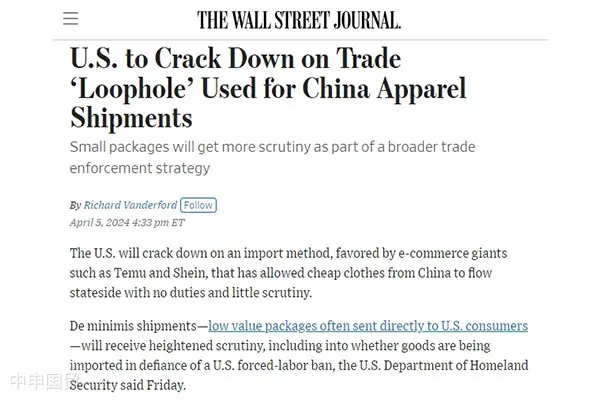- Shanghai Zhongshen International Trade Co., Ltd. - Two decades of trade agency expertise.
- Service Hotline: 139 1787 2118
In the US e - commerce market, Chinese e - commerce giants Temu and Shein are facing new challenges. According to a report by The Wall Street Journal, the US Department of Homeland Security announced on April 5 that it will implement stricter inspections on low - value packages that are usually directly sent to US consumers, especially those entering the US through the so - called “de minimis exemption” for shipping. The implementation of this measure means that cheap goods such as clothing from China will no longer be able to flow into the US market duty - free and almost without inspection.

This move is regarded as part of the USs broader trade enforcement strategy, aiming to crack down on the import methods favored by e - commerce platforms such as Temu and Shein. It is reported that about one billion such packages entered the US in this way in 2023, most of which were from China. Temu and Shein accounted for nearly one - third of these de minimis - exempt shipments.
At the same time, the US is considering reforming the current rule of the minimum threshold for import duties, that is, the tax - free policy for packages worth less than $800. In recent years, as the issue of tax - free low - value e - commerce imports has become increasingly prominent, US lawmakers have been calling for changes to this regulation more and more. It is estimated that the US incurs a tax loss of approximately $67 billion each year due to this.
The Americas Act proposed by Republican Congresswoman Maria Elvira Salazar provides a clear direction for the new minimum rule, aiming to provide $14 billion in financial support to the domestic textile manufacturing industry to encourage near - shoring. The proposer of this act suggests increasing tax revenue by adjusting the minimum tax rate, so as to fund near - shoring. Although this act is still in the initial stage of legislation, the call to lower the $800 minimum threshold shows that the demand for reforming this regulation is growing.
The latest actions of the US against Chinese e - commerce have raised serious concerns from China. Shu Jueting, a spokesperson for the Ministry of Commerce, responded at a regular press conference that the US report is unsubstantiated, and the accusations against Chinese e - commerce platforms are neither professional nor responsible. The Chinese government attaches great importance to data security and intellectual property protection, and is willing to strengthen cooperation with all parties to jointly create a fair - competition business environment for global enterprises.
Facing the new measures of the US, Chinese e - commerce platforms such as Temu and Shein may need to adjust their export strategies to the US market to cope with the more stringent inspections and potential tariff changes. At the same time, this US action may also prompt other countries to review their tax policies on e - commerce imports, thus affecting the development trend of the global e - commerce industry. With the short - term political uncertainty in the US, the industry is skeptical about whether the Americas Act can pass smoothly. But undoubtedly, the wind direction for the e - commerce industry is changing.
Related Recommendations
? 2025. All Rights Reserved. 滬ICP備2023007705號(hào)-2  PSB Record: Shanghai No.31011502009912
PSB Record: Shanghai No.31011502009912









